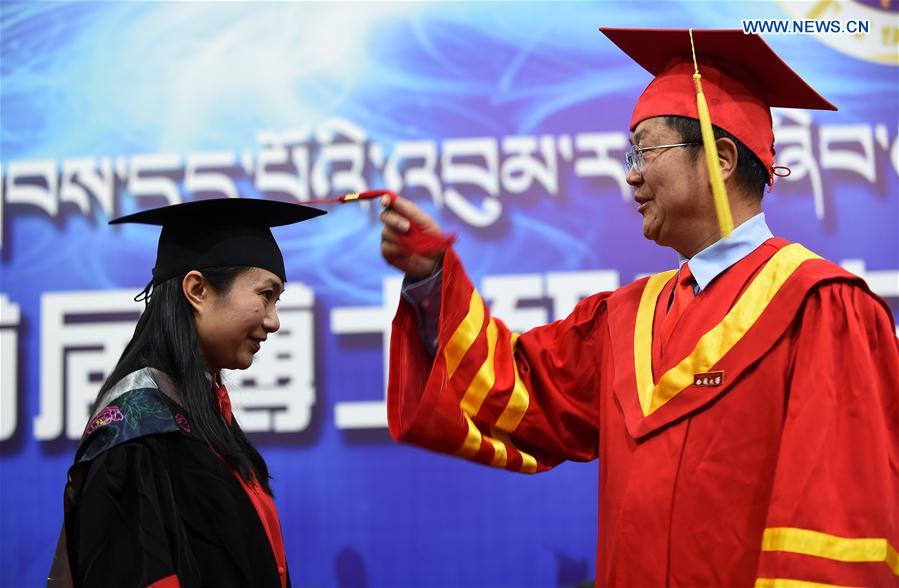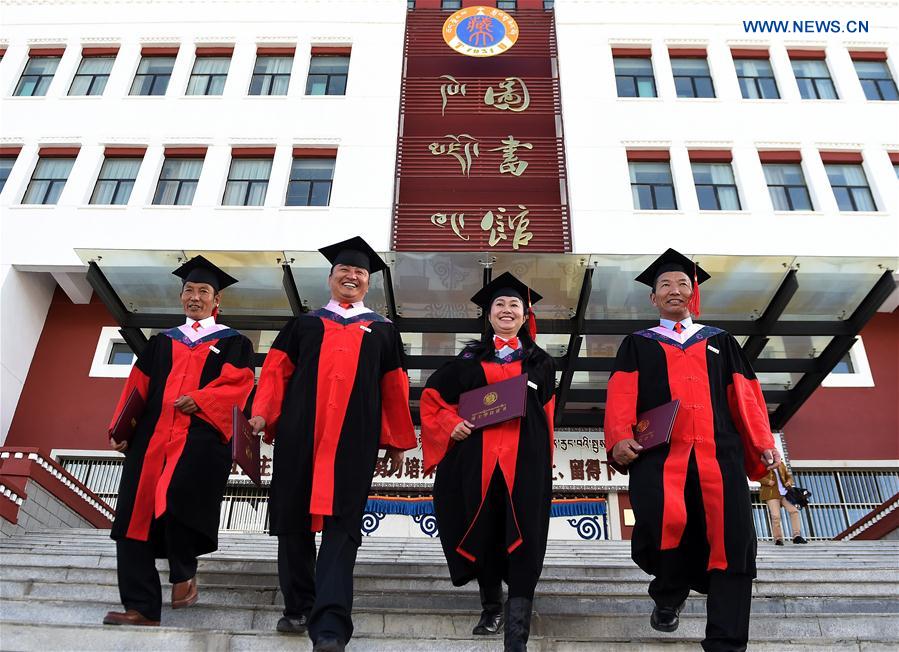New page started as Tibet awards doctorates for 1st time

President of Tibet University Ji Jianzhou turns the tassel for Zhang Hui during a graduation ceremony in Lhasa, southwest China's Tibet Autonomous Region, Nov. 10, 2017. Four PhD candidates researching Tibetan history, language or medicine became the first group of holders of doctorates awarded by a Tibetan university. [Photo/Xinhua]
LHASA, Nov. 10 (Xinhua) -- Four students in southwest China's Tibet Autonomous Region were granted doctorate degrees Friday, the first batch of doctorate degrees ever awarded by a Tibetan university.
The students majoring in Tibetan history, Tibetan language and literature, high-altitude medicine, attended the graduation ceremony at Tibet University Friday.
Though a "Gexe Lharampa," a title similar to a doctorate in Tibetan Buddhism, was awarded as the highest academic degree to lamas in Tibetan Buddhism studies in Tibet, an academic doctorate in the modern education system was previously absent in the region.
"As one of the first doctorate holders that were indigenously cultivated in Tibet, I appreciate very much the accomplishment of study under the government policy to protect and inherit ethnic culture," said Soinam Cering, 32, one of the graduates.
STUDY AT DOORSTEP
Soinam Cering is the son of a farmer in the region's Xigaze area.
When he was young, he loved reading books left by his grandfather, who had received private tutoring and engaged in filing historic archives after the emancipation of Tibet.
Reading a lot of history books, Soinam Cering grew a strong interest in Tibetan history. After graduating from university, he worked in the Xigaze government before enrolling as a Mandarin-Tibetan translation major for a master's degree in Tibet University.
"I had never dreamed of becoming a doctor before 2014," he said, adding that the high cost of being away from home was a major reason he hesitated to apply for a doctor's degree in other cities.
Tibet University was authorized to award doctorates in 2013.
The next year, when Soinam Cering graduated for his master's degree, he was first place in the enrollment exam, becoming the first doctorate student of Cedain Zhaxi, head of the China Tibetology research institute of the university.
Over the past three years, Soinam Cering wrote more than 10 papers.
He was also awarded a scholarship for doctors three times in a row funded by the central and regional government.

Four PhD graduates are seen after a graduation ceremony at Tibet University in Lhasa, southwest China's Tibet Autonomous Region, Nov. 10, 2017. Four PhD candidates researching Tibetan history, language or medicine became the first group of holders of doctorates awarded by a Tibetan university. [Photo/Xinhua]
MINIATURE OF REGIONAL DEVELOPMENT
According to Cedain Zhaxi, young people like Soinam Cering have a good command of both Mandarin and foreign language, enabling them to learn new research methods and helping them innovate in studying Tibetan history.
"Their broad vision will help fill the gaps of our previous generations," he said. "They are lucky, born in a new era with the rapid education development of our country."
Before Tibet was emancipated, only 5 percent of local people, from the families of land lords or rich merchants, had a chance to receive education, mostly in monasteries or old-style private schools.
"Tibetologists like us mostly received education after the emancipation," Cedain Zhaxi said, adding he was a beneficiary himself.
Cedain Zhaxi graduated from Tibet University in 1985 and stayed on to teach. Four years later, he was sent to Beijing-based Minzu University of China for further study.
Tibet University was authorized to award master's degrees in 1998, and doctor's degrees in 2013.
Cedain Zhaxi said the progress of Tibet University to offer higher educational degrees was a miniature of the development of higher education in Tibet.
Over the past six decades, the region has formed a modern educational system that covers every level of education.
It offers free education for 15 years from kindergarten to senior high school, one of the first provincial regions in China to do so.
The college admission rate for children of Tibetan farmers and herders reached 75.4 percent this year, according to educational authorities.
Currently, Tibet has seven higher education institutions, with over 60 students pursuing doctorate degrees.
Tao Ran, with the regional education department, said more universities in the region would apply for permits to grant master's and doctoral degrees, particularly in disciplines such as ethnic culture and plateau science, where they have an advantage.
"The higher education of Tibet has now started a new page," he said.
Your Comment
Name E-mailRelated News
-
;
Based in Lhasa, Tibet Vista is a Tibet travel agency that specialized in Tibet permit, and Tibet tours for both private and group travelers at a local price!
•4 Days Lhasa City Group Tour from USD 460 •8 Days Everest Base Camp Group Tour from USD 850 •15 Days Mt.Kailash Group Tour from USD 1780 •2016 Tibet Train Tours from Beijing, Shanghai, Chengdu, Xining,etc










